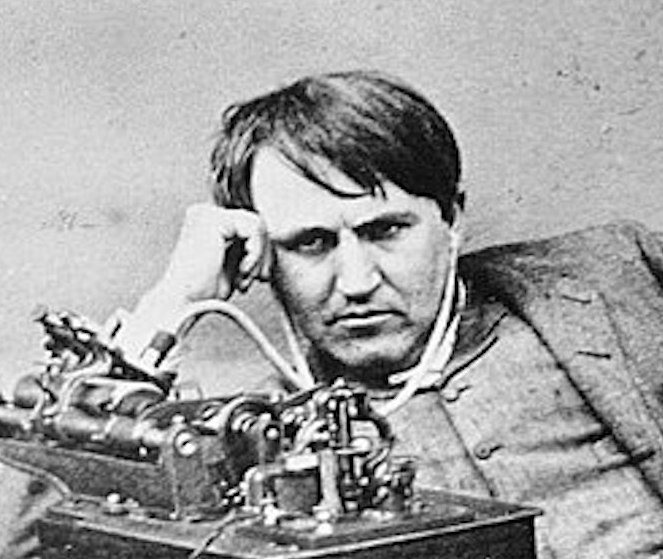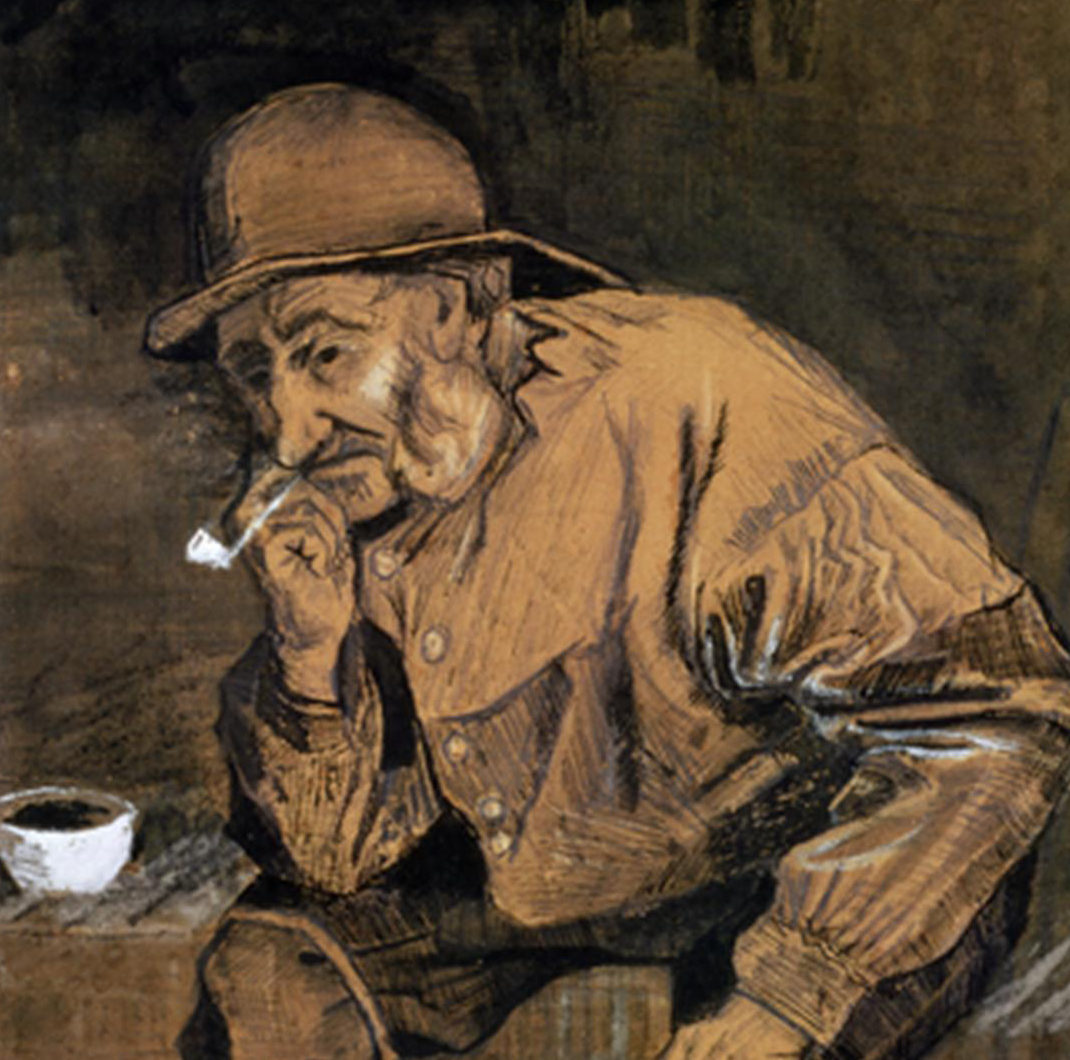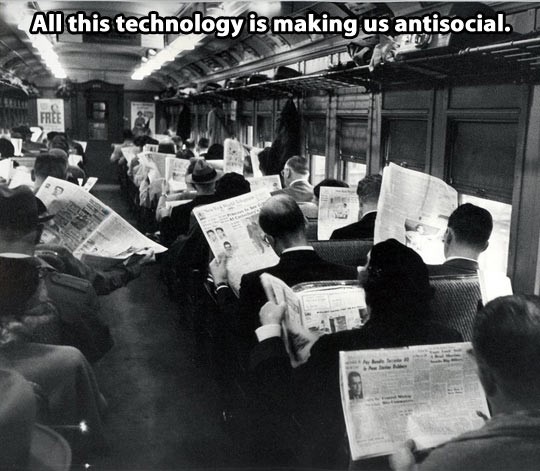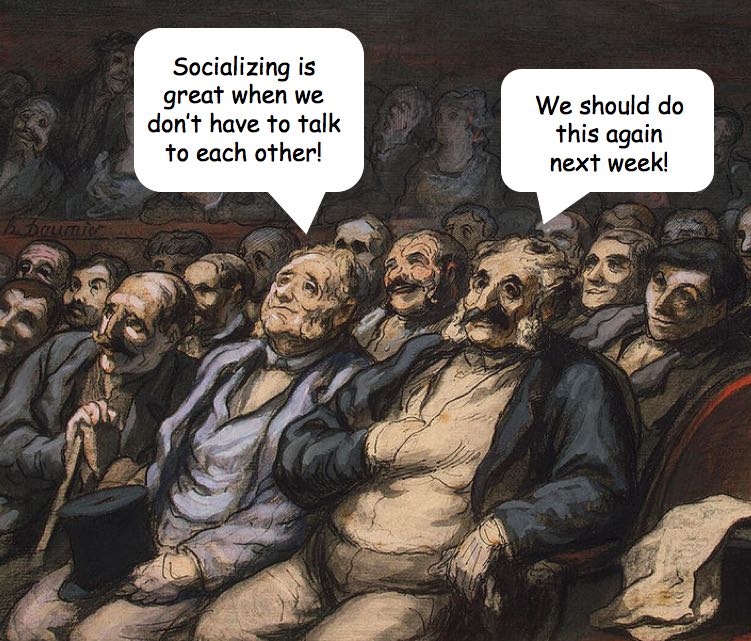

Ever heard this one?: “Nobody talks to each other anymore! Everyone’s always on their phones!” People long for a time, whether real or imagined, when everyone talked to everyone all the time, their family, their spouse, strangers walking down the street.
But did that time ever actually exist?
Perhaps, not, given the many ways people avoided conversation long before the digital age. Here are 10 ways introverts, curmudgeons, and private people avoided chit chat before phones:
1. Avoiding people completely

It’s not always possible to avoid people all the time. But throughout history, people have tried.
According to sources, the author Oliver Sacks’s first book “went unpublished because he lent its only manuscript to a colleague who committed suicide shortly thereafter—and Sacks was too shy to ask the man’s widow for the book’s return.”
Wow, dude.
Nathaniel Hawthorne was also famously shy. So shy, in fact, that when guests came over, he made his wife, who was also shy, talk to them while he hid away.
These introvert heroes avoided people without the crutch of a smartphone. They had to be a little more creative.
2. Reading a book

Books are the original smartphone. Obviously. But reading books to avoid conversation, or anything else for that matter, was pervasive in historical times.
The beloved Abraham Lincoln was a voracious reader. He could be in a crowded room, and be perfectly content just sitting in the corner reading his book. He read on his work breaks, by candlelight on the campaign train, pretty much anywhere he could.

In the 18th century, “reading mania” was a real “concern”. People started becoming concerned with too many youngsters reading books. Wow, what a terrible problem.
3. Thinking

Nowadays, if someone said, “don’t bother me, I’m thinking”, we would kindly wait the two more seconds until they were done and finished their thought. But thinking used to be something people did.
Not everyone is comfortable being alone with their own thoughts. But for the ones who are, thinking, reflection, and introspection have always been handy tools for introverts that don’t want to have boring conversations with boring people.
“I used to sit, think, think, thinking, till I felt as lonesome as a kitten in a wash–house copper with the lid on.” – Charles Dickens, Sketches by Boz
Plato said, “…why should we not calmly and patiently review our own thoughts…”
4. Become a Flâneur

What’s a Flâneur, you ask? It’s someone with “the ability to wander detached from society with no other purpose than to be an acute observer of society.” Or “the man of leisure, the idler, the urban explorer…”.

So to be a Flâneur, is to walk around the city just being cool and watching the bustle of the city, without a care, and without self-consciousness. This uniquely French concept makes avoiding conversation seem kinda cool and admirable. You’re just dootin’ around watching, taking in the “rich variety of the city landscape.”
And that’s way sexier than being the guy on his phone at the bar alone.
5. Reading the newspaper

This one’s obvious. A newspaper is basically just a fold-out phone that lost it’s wireless signal. And need we remind you of the memes that point out the similarity between holding a newspaper to avoid conversation, and holding a phone? We’re going to anyway:

And it’s true, “people” said the same thing about newspapers then as they do about phones now. Check out this nugget:
“The newspaper, people say, and the magazine are coming to monopolize the attention of reading men and women, dissipating their minds, frittering away their care for books and all sustained intellectual effort.” – New England Magazine, 1895.
6. Pretending to sleep

You have to pretty skilled to pull this one off, but before we could pop headphones in our ears or dive into our emails on the bus, we sometimes had to pretend to sleep to avoid talking.
Here’s a 19th-century fictional example:
“‘You are cold, sir.’ It had come at last, and I was obliged to make an observation. ‘I am,’ I answered; and thrusting the newspaper over my head, I feigned sleep to avoid conversation.'” – The Easter Trip of Two Oclophobists, Blackwood’s Magazine, 1867.
Here’s another:
“… but how could they know that Mrs. Balfour frequently feigned sleep that she might avoid talking to them…” – The Quiver, 1885
Or how about this one:
“Mary Anne was reported still quiet and asleep. I was, at least, aware that she wished to seem so, to avoid all conversation for this night.” – The Living Age, 1845
Want to learn how to fake sleep? Wikihow’s got you covered.
7. Listening to music

Listening to music has been a tried and true way of avoiding conversation for thousands of years, right up to the present. Nowadays, we can pop in some visible earbuds, but there have always been lyre players, opera singers, orchestras, conga drummers, banjo duos, and jazz bands to tune into while tuning out the people around you.

With the invention of headphones, however, no one needed to pretend to sleep or pretend to be disabled anymore, they could just cover their ears with technological escapism.

8. Avoiding public transportation

To use Nathaniel Hawthorne as an example once more, someone that knew Mr. Hawthorne reported that he hated to travel by train or stagecoach simply because he was afraid someone would try to talk to him. And that’s coming from a male, who doesn’t even have to put up with the creep factor.
If you do happen to be stuck on public transportation, History Hustle has this Victorian Life Tip:

At least trips are much shorter now. Imagine being stuck on the Oregon Trail next to Bubba, smiling, nodding, and pretending to care about his beaver-trapping stories for the whole six months.
9. Join a monastery or convent

There was a period of time when if you were well-connected, you might be able to live in an introvert’s paradise: a monastery or a convent. While the “vow of silence” may be more fiction than fact, these institutions are places where silence is encourages and expected. They were not a place to engage in small talk. Not with so much praying to do!

How much did they love silence? I don’t know, ask Issac:
“But then from our very silence is born something that draws us into deeper silence. May God give you an experience of this ‘something’ that is born of silence. If you practice this, inexpressible light will dawn upon you.” – Issac of Niniveh, 7th-century monk
A monk might spend the day reading, studying, writing, and copying texts, however, there were also some types of “customer service” in the form of education and medical assistance, but for the most part, you wouldn’t be expected to be chatty.
Oh, and if you’re one of those monks that brew beer and distill whiskey, well, there’s your social lubricant.

10. Labor

For much of history, if you weren’t a member of the social elite, you could always count on toiling away your life, much like today. It’s debatable whether historical peasants and farmers actually worked more hours than we’re accustomed to, but with so much farming to be done, one could seemingly escape a conversation for any number of outdoor labor activities.
Compare that to a modern office or retail job, where your coworkers are always just hanging nearby.
In fact avoiding conversation is explicitly recommended in this agricultural manual, The Ohio Cultivator. Well, that and where to finger the teat, of course:

So if relatives come to visit and want to know what you’ve been up to the last 15 years, just say you have some farming to do and toil away the time until they leave.
Want more history? Here are some medieval insults from History Hustle.